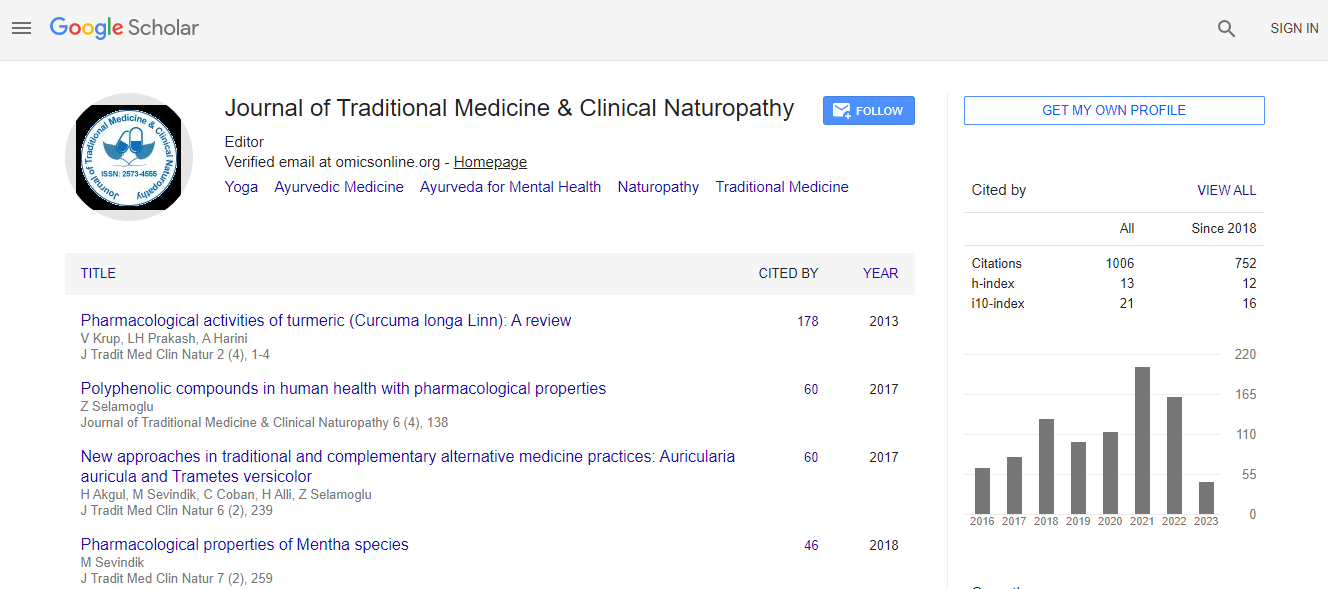Our Group organises 3000+ Global Conferenceseries Events every year across USA, Europe & Asia with support from 1000 more scientific Societies and Publishes 700+ Open Access Journals which contains over 50000 eminent personalities, reputed scientists as editorial board members.
Open Access Journals gaining more Readers and Citations
700 Journals and 15,000,000 Readers Each Journal is getting 25,000+ Readers
Google Scholar citation report
Citations : 1504
Journal of Traditional Medicine & Clinical Naturopathy peer review process verified at publons
Indexed In
- CAS Source Index (CASSI)
- Google Scholar
- Sherpa Romeo
- Open J Gate
- Genamics JournalSeek
- RefSeek
- Directory of Research Journal Indexing (DRJI)
- Hamdard University
- EBSCO A-Z
- Publons
- Geneva Foundation for Medical Education and Research
- Euro Pub
- ICMJE
Useful Links
Recommended Journals
Related Subjects
Share This Page
In vitro antifungal potency of aqueous extracts of suaeda monoica against some dermatophytes and yeasts
International Conference on Herbal & Traditional Medicine
Nojod Ahmed AL-Zumay, Manal Othman AL-Kattan and Enas Nabil Danial
University of Jeddah, Saudi Arabia
Posters & Accepted Abstracts: J Tradit Med Clin Natur
Abstract
The mangrove habitats get food and wide variety of traditional products and artifacts from mangroves. Extracts from different mangrove plants are reported to possess diverse medicinal properties such as antibacterial. Suaeda monoica is annual herb adapted to saline soil and lives in salt marshes or arid saline soil. Amaranthaceae family includes about (1300) species worldwide range from annual herbs to trees. The leaves contain triterpenoid, saponins, coumarins, phenolic compounds and alkaloids. The leaf of S. monoica is known to use as a medicine for hepatitis and scientifically it is reported to be used as ointment for wounds and possess antiviral activity, because of the presence of triterpenoids and sterols, antidiabetic and toothache. This study was aimed to identify antidermatophytic effects of cold and hot aqueous extracts of S. monoica against Microsprum gallina, M. gypsum, M. canis, Trichophyton mentagrophytes, T. vercossum, Epidermophyton floccosum, Candida albicans and C. tropicalis in vitro. Dry weight and disk agar diffusion MIC test of fungi were used to determine antidermatophytic. The results of our experiment indicate that, aqueous extracts of S. monoica have a high effective against M. gallina, M. gypsum, M. canis, T. mentagrophytes, T. vercossum, E. floccosum while low effective against C. albicans and C. tropicalis. The cold extract of S. monoica has a higher inhibition with concentrations (10 and 15 ml), whereas the hot extract has more effective than cold extract against tested fungi. The MIS values of hot extract showed the highest antifungal activity against M. gallina, M. gypsum, M. canis, T. mentagrophytes, T. vercossum, E. floccosum. Thus, this study recommended that S. monoica can be used to treat skin infections. There have also been some chemical tests that confirm the effect of these extracts on pathogenic fungi.Biography
Alzumay working as a Teaching Assistant at the University of Jeddah. She has joined the University of Jeddah in 2015. Ms. Alzumay has a special interest in Mycology and enjoys to choose study of dermatophytes as a part of her thesis. She received her degree of Bachelor in Microbilogy at 2011 in King Abdulaziz University and received her degree of Master in Mycology at 2018 in King Abdulaziz University. She worked in King Abdulaziz from 2012 to 2015.
E-mail: nnaazz_1410@hotmail.com

 Spanish
Spanish  Chinese
Chinese  Russian
Russian  German
German  French
French  Japanese
Japanese  Portuguese
Portuguese  Hindi
Hindi 
